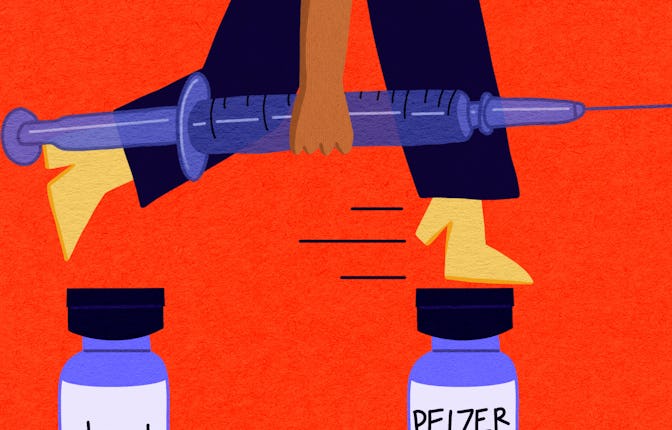What a variant-proof vaccine will look like, according to scientists
Medical experts are done playing whack-a-mole with these variants.

Ever spawning COVID variants have made the past two years exhausting, to say the least. I am so tired of worrying about how some tiny bizarre mutation to the spike protein of this itsy bitsy virus cell could affect me. Big Pharma recently tried to console us with promises of variant-specific vaccines, but they aren’t coming fast enough to keep up with the Greek alphabet of COVID terror. Thankfully, some forward-thinking scientists are working on a universal COVID vaccine.
“You don’t want to play this whack-a-mole approach. This could go on forever,” David Martinez, a viral immunologist at the University of North Carolina at Chapel Hill, told the Washington Post. Martinez is working with other scientists at UNC to develop a vaccine with “chimeric spikes.” What that means is that, instead of using the spike protein of just one coronavirus to create a vaccine, they are using a cocktail of variants that have different spike protein mutations. The idea is that it will be more difficult for new strains to evade a vaccine that uses this multi-pronged approach, according to the Washington Post.
In case you’re not a microbiologist, an analogy might be helpful here. Vaccines work by teaching our bodies to recognize and defend itself against invading viruses by showing them what potentially dangerous viruses look like. One of the problems we’ve encountered with coronavirus is that it changes so quickly that by the time our bodies are exposed to a new mutation, it looks very different from what the vaccine showed us, so our bodies don’t know how to fight it.
A chimeric spike vaccine would show our bodies different variations of what the coronavirus could look like, which makes it more likely that our immune systems will build up a defense against it. Scientists in other places are using nanoparticle technology to similar effect. Since there’s a lot to be gained — both financially and for public good — in creating a universal vaccine, scientists are coming at the problem from all angles.
Many experts think that striving for a universal vaccine could be a lot more effective than trying to take on each variant as it appears. “I worry about chasing variants, because there’s always going to be a new variant,” Drew Weissman, a vaccine pioneer and immunologist at the University of Pennsylvania Perelman School of Medicine who is working on a pan-coronavirus vaccine, told the Washington Post.
Unfortunately, there’s no ETA as of yet. If researchers succeed in making a universal coronavirus vaccine, it will be the first of its kind. “To make a universal vaccine is an order of magnitude more complicated. Science has never been able to make a universal vaccine to anything, ever,” David Morens, an NIH researcher, told Vox. The good news is that researchers are expecting to be able release the results of the first pan-COVID vaccine human trials soon.